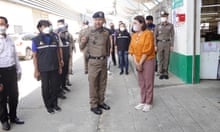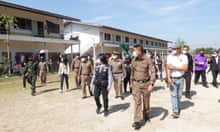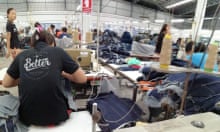A seven-year-old girl was raped in insecure accommodation at a factory producing clothes for Tesco in Thailand while her mother sewed F&F jeans late in the evening, it has been revealed.
Her mother said she had been working unpaid overtime until 10pm, after which she returned to her room to find her daughter bleeding and in distress, having been raped by a colleague.
She said an assistant manager at the factory told her not to call an ambulance because clinicians might call the police.
The girl and her mother are both claimants in a landmark lawsuit being brought in England against Tesco on behalf of 130 Burmese former workers at the VK Garment (VKG) factory, who are suing for alleged negligence and unjust enrichment. Tesco, which was not involved in the day to day running of the factory, said it only became aware of the incident this year and that had it been alerted to it at the time it happened, it would have ended its relationship with VKG immediately.
Workers at VKG made jeans and other F&F clothes for adults and children between 2017 and 2020 that were supplied to the Thai arm of Tesco’s business. Tesco said the garments were sold only on the Thai market, although the Guardian has seen images of labels written in English on clothes made there. Profits from sales in Thailand went back to the UK.
The attack happened on 4 August 2018 while the girl was sleeping in the room with her younger sister. A 19-year-old man who lived in an adjoining room was able to walk in because their room only had a scrap of fabric for a door and thin walls that did not reach the ceiling.
The rapist, who also worked at the factory, was sentenced to five years and four months in prison in December 2018.
The girl’s mother recalled arriving back at their room at about 10pm to find her oldest daughter bleeding and distraught. “She told me: ‘Mummy, someone came and did bad things to me.’”
The mother, whom the Guardian is not naming, said her brother managed to catch the man, but that the factory “did nothing”.
She said an assistant manager at VKG had been more worried about police checks at the factory than helping her daughter. “He said: ‘Don’t call the ambulance. If you call the ambulance, the police will come and that will make trouble for our factory, so don’t call them.’”
She added: “I felt helpless because I was working in their country, I didn’t have any background here, we only depended on the factory and we had no one to help us.”
In the end she said a social worker for another factory in the compound called an ambulance and the police, and they went to Mae Sot general hospital. She said nobody from VKG spoke to her about what happened but a manager from the factory did visit the hospital and gave her about £20.
“I feel it is up to VKG and Tesco to take responsibility for my daughter’s case but they haven’t,” she said. “I worked and lived in the factory when the case happened, I informed them and they didn’t even call an ambulance. They didn’t take any responsibility for us.”
The mother, whose trauma was evident when she described her daughter’s ordeal, said she had always been worried about the children staying in the top-floor room alone but previously her main concern had been her toddler falling on the steep steps. She said she was made to feel bad for checking on her children every few hours and was shouted at about it, even though she was paid only for what she could make.
Along with many other parents at the factory, she felt she had no choice but to work while her children were unsupervised, in order to earn enough to feed her family.
“I felt unsafe in the dormitory that VKG provided to us,” she said, and explained that while she was working, she worried about her children because there were steep stairs and “was afraid they would fall down or something would happen”.
She said that she sewed about 5,000 pairs of F&F jeans and trousers a month and would work as fast as she could in order to buy time to enable her to run and check on the children. She said she worked until at least 10pm every night except Sunday – sometimes right through the night. She says she was usually paid about £4 a day, well below the £7 Thai minimum wage at the time and that depended on how much she could make.
“This has been really terrible for my family,” she continued. “Even though we try and forget the past, of what happened at VKG, we cannot forget it easily. When I was working there I made just enough money to get food to feed our mouths. It was not an easy way to live. I made just enough for our family to survive.”
The family moved to Thailand in 2005 after struggling to find work in Myanmar, but now they are in debt and her husband is ill with kidney problems. “My hope was that I would save money working in Thailand and then go back to Myanmar and settle down with the money I saved in Thailand,” the mother recalled. “But it did not happen and now I can’t even go back.
Anna Barr, a solicitor at Leigh Day, the law firm bringing the case, said: “The disturbing sexual violence experienced by the child claimant is absolutely abhorrent and a profound infringement of her physical and psychological integrity.
“The mother and child claimant are deeply traumatised. They argue in their legal case that their living conditions were clearly unsafe and privacy and security were dangerously limited. The claimants argue that the Tesco defendants committed to preventing human rights abuses in their supply chain and should have taken adequate steps to ensure that this abuse did not happen.”
A spokesperson for Tesco said: “This is an horrific incident and our thoughts go out to the victim and everyone affected by it. Had we been alerted to it at the time it took place, we would have ended our relationship with this supplier immediately. Unfortunately we were not made aware until earlier this year, more than a year after the sale of our business in Asia.”
Sirikul Tatiyawongpaibul, the managing director of VKG, did not comment on the specific details of the rape case but called the allegations of the 21 workers interviewed by the Guardian “hearsay”. She said their claims about working conditions should be presented in court and could not be commented on, given an ongoing case in the Thai labour courts.
She said: “The company’s rules and regulations are in line with Thailand’s labour law, with employment and working conditions, in line with conditions laid out by the department of labour protection and welfare, and customers … The company has fought the case with facts and does not plan to shut down operations. It is necessary for the company to demand justice under Thailand’s judicial process.”
Many workers at the factory lived in the accommodation provided on site, which consisted of overcrowded rooms with concrete floors to sleep on and dirty pond water in a bucket to wash. Workers said the rooms on the upstairs floor had no door, just a curtain, and the thin walls did not reach the ceiling, offering no security.
Several other workers described children roaming the factory floor or waiting in rooms because their parents could not afford childcare.
One family described having to rush their two-year-old daughter to hospital after a heavy machine fell on her leg while she played on a hammock tied to it. Her parents said the incident took place at about 10pm and said the manager told the father not to tell police it had happened at the factory. The X-ray came back clear but they said it was a near-miss that their daughter was not more seriously injured.
The girl’s mother, Myat Su Mon, 31, said: “We had to bring our child to work. It’s unsafe for children but we didn’t have a choice. We had to continue our work.
“The factory is a bad place and it’s difficult to work there and take care of children. But at the same time we have to have money so we have to work.”






